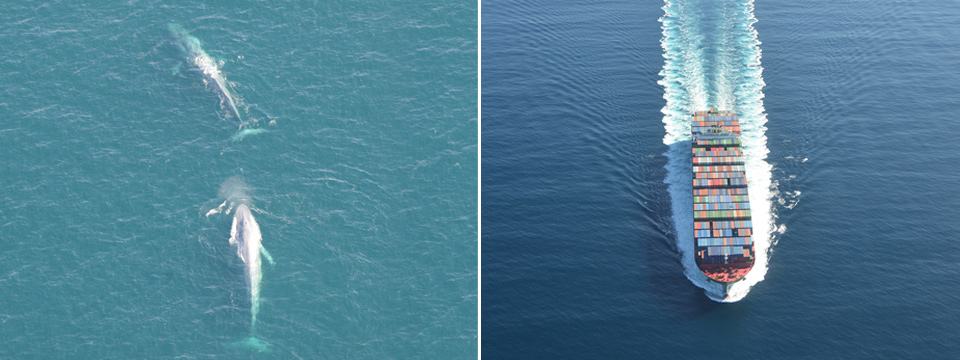(stock image)
Source: Air Pollution Control District
The partners in an initiative to cut air pollution and protect whales [Tuesday] announced the launch of the 2018 incentive program, which will start July 1 and end November 15, 2018, with voluntary vessel speed reduction (VSR) zones in the Santa Barbara Channel region and San Francisco Bay area.
For the 2018 program, financial incentives will be awarded to shipping companies based on the percent of distance traveled by their vessels through the VSR zones at 10 knots or less and with an average speed that does not exceed 12 knots. The 10 knot target was selected by the partnership for consistency. National Oceanic and Atmospheric Administration (NOAA) Sanctuaries request vessels 300 gross tons or larger to slow to 10 knots or less during the months of peak whale abundance to protect whales from lethal ship strikes.
Shipping companies will receive financial awards at different tiers based on their fleet’s adherence to the program criteria. The four award tiers will be bronze, silver, gold and sapphire. Close to $300,000 is available for the 2018 program. Awards will range from approximately $1,000 to $35,000 (or greater in special circumstances) per company.

Ventura County Air Pollution Control District (VCAPCD) is providing $175,000 for the 2018 Program from a Supplemental Environmental Project settlement secured through the California Air Resources Board. Mike Villegas, Air Pollution Control Officer at VCAPCD, said, “We are so pleased to receive this settlement funding, which ensures $175,000 for 2018, and another $175,000 towards a 2019 program. Reducing vessel speeds greatly reduces emissions of smog-forming pollutants, and will help our District attain state and federal air quality standards for ozone (smog).”
The balance of funding for the 2018 Program is from the other air districts participating, and the Volgenau Foundation. Said Aeron Arlin Genet, Director of Santa Barbara County Air Pollution Control District, “We are excited to expand the program this year to a fleet-based approach. This will provide enhanced recognition to those companies that make the greatest commitments to improving air quality and protecting whales.”
Chris Mobley, superintendent of the Channel Islands National Marine Sanctuary, noted, “The expansion of the Vessel Speed Reduction program and harmonizing it with our seasonal whale advisory zone enhances our conservation efforts for blue, humpback and fin whales feeding in West Coast national marine sanctuaries.”
Michael Carver, Deputy Superintendent with Cordell Bank National Marine Sanctuary, said, “During the period of peak whale abundance, the Bay Area Greater Farallones and Cordell Bank National Marine Sanctuaries have requested that vessels slow to 10 knots in the San Francisco traffic lanes. This year we look forward to recognizing, in partnership with the Bay Area Air Quality Mangement District, those companies that have made the greatest commitment to improving air quality and protecting whales.”
Said Kristen Hislop, Marine Conservation Program Director at the Environmental Defense Center, “As one of the founding partners of the first VSR program in the Santa Barbara Channel in 2014, we are encouraged by the growth of this program and pleased with the enhanced protection this year’s 10 knot goal provides endangered whales in our region.”
“With the expansion of the program to the Bay Area last year, the Air District was impressed by the response from the shipping companies committing to improve air quality and protect whales,” said Jack Broadbent, Executive Officer of the Bay Area Air Quality Management District. “By continuing these efforts to reduce the speeds of shipping vessels this summer, our region can benefit from improvements in air quality and to the marine environment.”
“We congratulate the air pollution control districts and the west coast national marine sanctuaries for working together with shipping companies on this important partnership to improve air quality and conserve whales. The fleet-based approach and tying incentives to seasonal whale advisory zones will strengthen these goals,” said Kristen Sarri, President and CEO of the National Marine Sanctuary Foundation.
To participate in the program, companies are asked to submit by June 30 if possible (and no later than July 10, 2018) the list of vessels (container ships and roll-on, roll-off vessels known as Ro-Ros) that will be transiting the VSR regions July 1-November 15, 2018. Additional information, including maps, materials and signup forms, is available at www.ourair.org/air-pollution-





